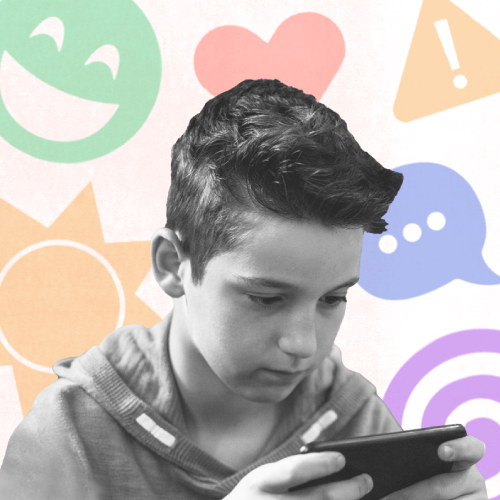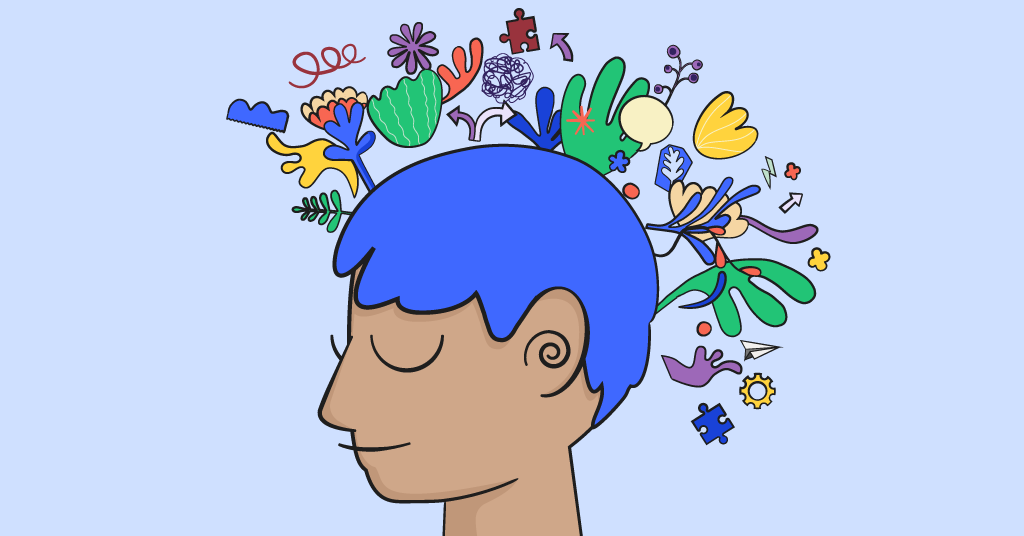
Quick note: If you aren’t familiar with terms surrounding the LGBTQ+ community, this blog post can help you understand common words and phrases.
Do you remember the first time your kid had a crush on someone? They may have been excited to wear their favorite outfit to school in an attempt to look their best. Maybe you found them doodling hearts in their notebook. Or perhaps they were too shy to even approach the person they thought was super cool. While those first fluttery butterflies are certainly memorable, for many LGBTQ+ kids, realizing they like like someone can be an incredibly stressful experience. No matter how accepting their family is, a child can feel anxious after realizing that they aren’t straight or don’t identify with the gender to which they were assigned at birth.
Before you keep reading, take a deep breath and remember that, above all, showing your child love is the most important way you can help them. “We know that having one accepting person in an LGBTQ person’s life can reduce the risk of suicide by 40 percent,” Amit Paley, the CEO of The Trevor Project, an organization that provides crisis intervention and suicide prevention for LGBTQ+ kids, told The Washington Post. You have so much power to really make a difference in your child’s mental health.
Bark spoke with Dr. T.M. Robinson-Mosley, an LGBTQ+-affirming counseling psychologist and licensed therapist, about what parents should know about supporting their LGBTQ+ kids’ mental health.
LGBT Mental Health: What You Need To Know
Every child’s situation is unique to them, so there is certainly no one overall experience for LGBTQ+ folks. Generally speaking, however, teens in this community have mental health issues at a higher rate than their straight, cisgendered peers.
“Unfortunately, LGBTQ+ teens report significant challenges to their mental health and overall wellness,” Dr. Robinson-Mosley says. “They are more likely to experience increased levels of stress, anxiety, depression, and rejection, and they overwhelmingly report feeling unsafe in their own school classrooms.”
No matter how they identify, we hope you show your child love and sincere support. Many families aren’t so welcoming and can even go so far as to subject them to conversion therapy or kick them out of the house. But even when LGBTQ+ kids come from families who allow them to freely be themselves, they can still find themselves facing some challenges. Dr. Robinson-Mosley explains that — along with anxieties about being rejected by their families — kids in this community can find themselves experiencing harassment, bullying, isolation, suicidal ideation, and rejection from the children around them.
According to a survey conducted by The Human Rights Campaign (HRC) Foundation and the University of Connecticut, 70% of LGBTQ+ teens reported feelings of worthlessness and hopelessness in the past week. 95% reported trouble sleeping at night. Only 26% said they always feel safe in their school classrooms. Keeping this in mind, it’s important to remember that protecting your kid means being attuned to their mental health in addition to their physical health.
Potential Signs of LGBT Mental Health Concerns
Hopefully, you have a great relationship with your child and they feel comfortable asking you for support any time they’re experiencing something difficult. But talking about mental health struggles can be difficult for many kids, so it’s also a good idea to be aware of some things to watch out for.
Anything out of the ordinary
First of all, you’re the expert on your own child, so if you notice any significant change in their behavior, that’s worth paying attention to, Dr. Robinson-Mosley says. More specifically, though, if your kid goes from being a social butterfly who has plenty of energy for after-school activities to withdrawing and becoming less interested in the things they used to love or less motivated to work hard at the hobbies that bring them joy, that could indicate an early warning sign of a mental health concern. If you know your child to be someone who’s very easygoing and pretty consistently happy but they start snapping at those around them and crying, being angry, feeling confused, or worrying more than usual, Dr. Robinson-Mosley says that’s probably worth noting.
Decisions they’re making
The choices your kid is making can also give you some insight into what they may be experiencing. Perhaps their grades have suddenly started slipping. Maybe they’ve started smoking or drinking alcohol. Or maybe you’ve even found out that they’re beginning to experiment with drugs for the first time. Of course, none of these things point definitively to a mental health problem. A number of things could cause experimenting with substances or slipping grades, but it’s a good idea to pay attention if this is something you’re seeing, and to connect your kid with a mental health professional if they need it.
What to do if you notice something
In addition to watching out for some of these signs, you should regularly provide your child with the space to open up to you on their own terms. While having a mental health check-in may feel awkward at first, being intentional about regularly asking your child if they’d like to share how they’re feeling can help them become more comfortable with coming to you if they need some extra support. They should, of course, know they can approach you with concerns at any time, but devoting a dedicated moment to connect — like during the drive home after soccer practice or while making breakfast together on Saturday mornings — can help them feel supported and heard.
Ways You Can Support Your Child’s Mental Health
Dr. Robinson-Mosley shares some ways you can give your kid the encouragement and resources they need to feel their best:
- Tell them you love them. When your child opens up about their LGBTQ+ identity or gender expression, be quick to show affection and acceptance.
- Listen. You might assume that — as the parent — you have to be the one driving the conversation, but make space for your child to lead so you can hear what they have to say.
- Advocate for them. It’s important to require that all family members, colleagues, and friends respect your child and their identity.
- Find a community. Your child can really benefit from connecting with other LGBTQ+ youth.
- Get support. You might find it helpful to join a group such as PFLAG, which offers support to parents, families, and allies.
- Report mistreatment. If your kid is experiencing bullying, make sure you stand up for them and get them the help they need.
- Consider faith. If you are part of a faith tradition, look for a house of worship that welcomes you and your child.
- Respect their relationships. When your kid is old enough to date, welcome their partner to family events. If they’re still too young for a significant other, let them know they can always talk to you about who they’re interested in.
Consider Other Ways Their Identity May Affect Their Mental Health
“Due to their intersecting identities, Black and Indigenous LGBTQ youth of color experience unique challenges and elevated stress,” Dr. Robinson-Mosley explains. “Additionally, Black teens may experience racial discrimination, isolation, and other race-related stressors that affect their academic performance and overall satisfaction.” She says Black LGBTQ youth can be less likely to use professional mental health services, which can have serious consequences. In fact, between 1991 and 2017, suicide attempts among Black teens increased by 73%, while attempts among white LGBTQ youth decreased.
The Biggest Thing You Can Do to Help
Feeling a little overwhelmed by this information? That’s OK. If there’s one thing you should know about supporting the child in your life, it’s to do just that — support them. “Failing to affirm and support LGBTQ young people can damage their self-esteem and self-worth and prevent them from developing into healthy adults,” Dr. Robinson-Mosley says. “The trauma of experiencing rejection and abandonment from family members can significantly impact the trajectory of LGBTQ+ children's lives. And in the most tragic instances, these unsupportive behaviors can result in life-ending consequences.”
Instead of assuming your kid knows you love them, be intentional about affirming how much you care for them. This might mean taking the time to bake their oh-so-complicated favorite caramel cheesecake as a surprise. Or maybe nothing means more to them than getting some good one-on-one time during a long walk outdoors. Whatever their love language, be sure you also tell them you love them regularly so they never doubt it even for a second.
Additional Resources
- National Queer and Trans Therapists of Color Network
- The Association of LGBTQ+ Psychiatrists
- LGBT National Help Center
- Suicide Prevention Lifeline
- LGBT National Youth Talkline
- Coming Out: A Handbook for Young LGBTQ People
- A Guide to Being an Ally To Transgender and Nonbinary Youth
- Supporting Black LGBTQ Youth Mental Health
Read more
Bark helps families manage and protect their children’s digital lives.






